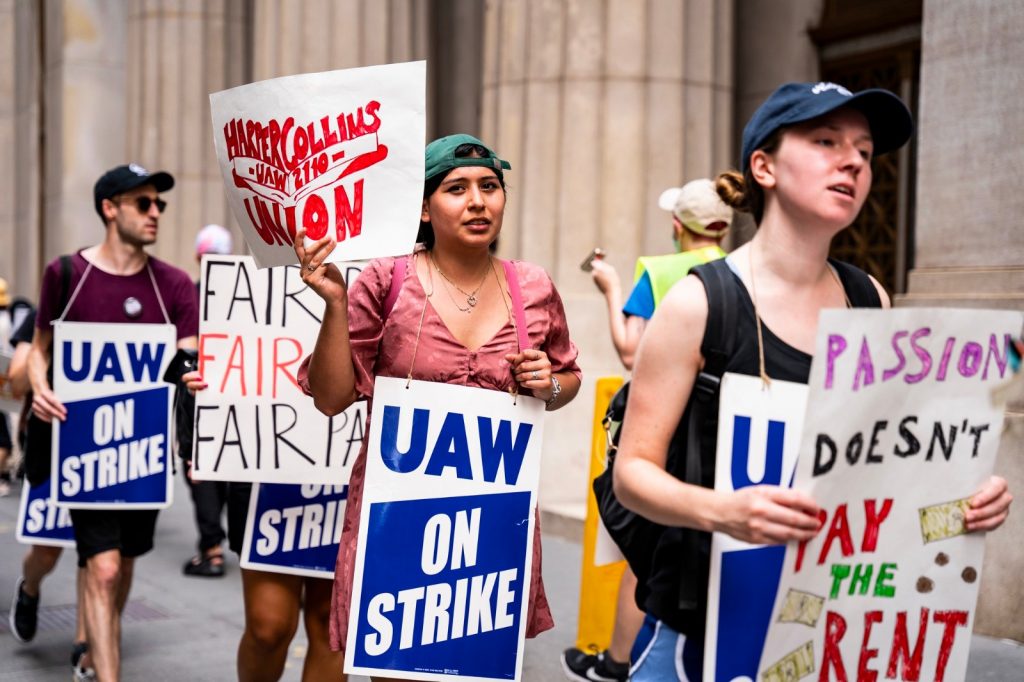Yesterday, workers at the “Big Four” publisher HarperCollins went on a one-day strike, protesting the company’s refusal to agree to a fair contract. The workers, who have organized with United Auto Workers Local 2110, are demanding liveable wages, better family leave benefits, and stronger commitments to racial equity. Even though management threatened to dock the pay of striking workers, and even though temperatures approached 100 degrees, the energy of the moving picket outside the company’s headquarters at 195 Broadway was vibrant, militant, and joyful.
Of the 250 or so unionized workers —across the company’s editorial, publicity, sales, design, marketing and legal departments — 95 percent took part in the vote to strike, with 99 percent in favor.
HarperCollins, which is owned by Rupert Murdoch-founded NewsCorp, has seen its revenues rise by 12 percent so far this year. In fact, publishing is one of the few industries that boomed during the pandemic, and profits are higher than they were in 2019.
But full-time workers are still unable to make ends meet. Starting salaries at HarperCollins are $45,000; the average salary is $55,000. As is endemic throughout the industry, the company’s mostly female workforce is often forced to take on freelance work or rely on their family’s or partner’s income to survive. And nationwide, rising inflation rates have effectively reduced average wages by 2.5 percent. The CEO of NewsCorp’s salary increased by 70 percent in 2021: he took home $26 million that year, whereas the raises the union is asking for would only cost the company $3 million. “In 2021, Newscorp did stock buybacks,” one employee explained. “They put the profits that we earned in the pockets of shareholders. And people know this, and they’re upset about it. They want their fair share.”
Making matters worse, workers are being asked to return to the office in one of the most expensive cities in the world, ending the pandemic policy of remote work. On the @xoxopublishinggg Instagram account, where publishing workers trade gossip about their industries, it was reported that the company’s snack bins, which were touted by management as a return-to-office perk, were infested with maggots.
One repeated chant on the picket line was, “passion doesn’t pay the rent!” Publishing — similar to other white-collar media and arts industries — relies on a specific form of exploitation to function. To work in publishing, echoed by every HR staffer as they post job listings online, one must have “a passion for books.” Every time workers are expected to accept dismally low salaries, take on unfeasible workloads, work outside their designated hours for no pay, and put up with abuse from authors and senior staff, management invokes this “passion for books.” If you as a worker do not accept these conditions, then your own “passion for books”- —which for many workers is a core part of their identity — is called into question.
If “passion” is so essential for the job, then surely workers who are passionate and care deeply about their books and their authors deserve higher compensation. Instead, management throws around “passion” as a tactic to keep workers from the wages and the working conditions that they deserve.
Publishing is a predominantly white industry, particularly at senior levels, and a family background of some wealth is often assumed, which perpetuates its racial barriers. Companies generally require workers to possess four-year degrees and live in the most expensive cities in the country. It’s not uncommon to hear management voice surprise that their employees don’t have financial help from their parents, or don’t come from wealthy backgrounds, and that it’s “entitled” to discuss money and working conditions when one has the chance to work in such a prestigious industry. In the wake of the 2020 Black Lives Matter movement, many publishers have started making performative displays of anti-racism and efforts and diversity, which are mainly for appearances. As one worker explained, HarperCollins won’t even agree to commit to interviewing a person of color for each open position. One sign on the picket line read, “If Black Lives Mattered to Them, They’d Pay Them a Living Wage.”
As young women make up the majority of the staff at junior levels and more men are represented at the senior levels as well as among authors, sexual harassment and misogyny have long been rampant, which was spotlighted in 2017 during the emergence of #MeToo and the “Shitty Media Men” list. Most of the women documenting their stories referred to the power imbalance of their workplaces, which made resisting or reporting unwanted advances difficult, and where the expectation not to “jeopordize the mission” outweighed her own safety and well-being. Improved HR procedures won’t address this, because they do not correct the imbalance of power. Rather, only collective worker organizing can address this kind of sexual predation. There is no path towards racial equity or gender equity without organized labor, no matter what “diversity initiatives” or “sexual hararssment trainings” are instituted by management.
This strike comes in the midst of increased unionization around the country and a reenergized, increasingly militant labor movement, mainly led by young women and queer folks. At the strike, CUNY PSC, Center for Reproductive Justice Union, as well as UPS Teamsters walked the picket lines with HarperCollins workers. A recently fired Starbucks worker, Austin, came to show solidarity, and HarpersCollins workers announced the rally for his rehiring, which will take place on Friday.
HarperCollins is the only unionized big-four publisher, but in recent years, workers at several other smaller publishers have also joined unions. As publishing companies reap record profits while the workers who made those profits see none of them, it’s time that all publishing workers realize exactly how essential they are and refuse to accept “prestige” instead of a fair wage. “We love making books, and we love spending all day around books,” said one HarperCollins worker on the picket line. “But we also know our worth and we’re willing to do whatever it takes to get the contract we deserve.”










